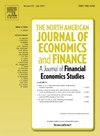Economic policy uncertainty, investor sentiment and systemic financial risk: Evidence from China
IF 3.8
3区 经济学
Q1 BUSINESS, FINANCE
North American Journal of Economics and Finance
Pub Date : 2025-01-01
DOI:10.1016/j.najef.2024.102356
引用次数: 0
Abstract
Based on the construction of systemic financial risk metrics using the TVP-FAVAR model, this paper explores the dynamic evolutionary relationship between economic policy uncertainty (EPU), different dimensions of investor sentiment and systemic financial risk using the TVP-SV-VAR model. It also examines the cross-market contagion mechanism of systemic financial risk under EPU shocks and the role of investor sentiment in it from two dimensions: financial market and economic fundamentals. The study finds that (1) the short- and medium-term effects of EPU on systemic financial risk are more stable and significant than the long-term effects. (2) Micro investor sentiment has the strongest shock effect on systemic financial risk. (3) There are differences in the timing and extent of direct shocks to EPU across financial sub-markets and economic sectors, and risk contagion effects among each other and indirect shocks from investor sentiment further increase the level of systemic financial risk. This study is of great significance for coping with EPU and investor sentiment shocks and preventing and resolving systemic financial risks.
经济政策不确定性、投资者情绪与系统性金融风险:来自中国的证据
本文在构建系统金融风险度量指标的基础上,利用TVP-SV-VAR模型探讨了经济政策不确定性(EPU)、不同维度投资者情绪与系统金融风险之间的动态演化关系。本文还从金融市场和经济基本面两个维度考察了EPU冲击下系统性金融风险的跨市场传染机制以及投资者情绪在其中的作用。研究发现:(1)EPU对系统性金融风险的短期和中期影响比长期影响更为稳定和显著。(2)微观投资者情绪对系统性金融风险的冲击效应最强。(3)各金融子市场和经济部门对EPU直接冲击的时间和程度存在差异,相互之间的风险传染效应和投资者情绪的间接冲击进一步提高了系统性金融风险水平。本研究对于应对EPU和投资者情绪冲击,防范和化解系统性金融风险具有重要意义。
本文章由计算机程序翻译,如有差异,请以英文原文为准。
求助全文
约1分钟内获得全文
求助全文
来源期刊
CiteScore
7.30
自引率
8.30%
发文量
168
期刊介绍:
The focus of the North-American Journal of Economics and Finance is on the economics of integration of goods, services, financial markets, at both regional and global levels with the role of economic policy in that process playing an important role. Both theoretical and empirical papers are welcome. Empirical and policy-related papers that rely on data and the experiences of countries outside North America are also welcome. Papers should offer concrete lessons about the ongoing process of globalization, or policy implications about how governments, domestic or international institutions, can improve the coordination of their activities. Empirical analysis should be capable of replication. Authors of accepted papers will be encouraged to supply data and computer programs.

 求助内容:
求助内容: 应助结果提醒方式:
应助结果提醒方式:


